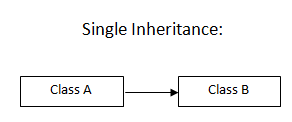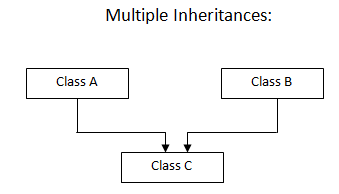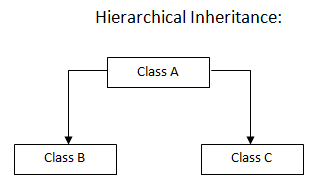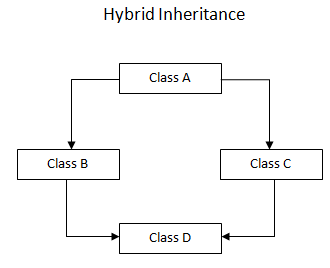It is the technique of deriving a new class from the class which already exists.
The new class is called the derived class and the old class is called the base class.
You will understand more practically while going through this tutorial.
Advantages of Inheritance:
Syntax:
class Derived : access_modifier Base
{
Body of class Derived;
}
The colon (:) indicates that the class Derived is derived from the class Base.
The access modifier is either public or private.
When it is public then the public and protected data members of Base become public members of Derived.
When the access modifier is private, then the public and protected data members of Base become private members of Derived.
On broadly classifying, there are 5 major types of inheritance.
In this, only one class is derived from one base class.

C++ Program for Single Inheritance:
#include <iostream>
using namespace std;
class A
{
public:
int a,b;
void getdata()
{
cout<<"Enter two numbers: "<<endl;
cin>>a>>b;
}
};
class B:public A
{
int c;
public:
void showdata()
{
c=a*b;
cout<<"The entered numbers are: "<<a<<" and "<<b<<endl;
cout<<"The product is: "<<c<<endl;
}
};
int main()
{
B obj;
obj.getdata();
obj.showdata();
return 0;
}
Output:
Enter two numbers: 22 20 The entered number are 20 and 22. The product is 440
Here,
obj is the object of class B and it is calling inherited function getdata() of class A.It is an extended version of single inheritance, where other classes are further derived from the derived class.

C++ Program for Multilevel Inheritance:
#include <iostream>
using namespace std;
class A
{
public:
int a,b;
void getdata()
{
cout<<"Enter two numbers: "<<endl;
cin>>a>>b;
}
};
class B:public A
{
public:
int c;
void avgdata()
{
c=(a*b)/2;
}
};
class C:public B
{
public:
void showdata()
{
cout<<"The entered numbers are "<<a<<" and "<<b<<endl;
cout<<"Their average is "<<c<<endl;
}
};
int main()
{
C obj;
obj.getdata();
obj.avgdata();
obj.showdata();
return 0;
}
Output:
Enter two numbers: 12 24 The entered numbers are 12 and 24 Their average is 18.
In this, a derived class is invoked from more than one base class.

C++ Program for Multiple Inheritance:
#include <iostream>
using namespace std;
class A
{
public:
int i;
void geti()
{
cout<<"Enter the number: "<<endl;
cin>>i;
}
};
class B
{
public:
int j;
void evaluate()
{
if(j%2==0)
{
cout<<"Entered number is even."<<endl;
}
else
{
cout<<"Entered number is odd."<<endl;
}
}
};
class C : public A, public B
{
public:
void display()
{
cout<<"Multiple inheritance successfully executed."<<endl;
}
};
int main()
{
C obj;
obj.geti();
obj. j=obj.i;
obj.evaluate();
obj.display();
return 0;
}
Output:
Enter the number: 76 Entered number is even. Multiple inheritance successfully executed.
In this, more than one derived classes are derived from one base class.

C++ Program for Hierarchical Inheritance:
#include <iostream>
using namespace std;
class A
{
public :
int a,b;
void getdata()
{
cout<<"Enter the two operands: "<<endl;
cin>>a>>b;
}
};
class B : public A
{
public:
int x,y;
void campare()
{
if(x>y)
{
cout<<"First operand is greater than the second one."<<endl;
}
else
{
cout<<"Second operand is greater than the first one."<<endl;
}
}
};
class C : public A
{
public:
int p,q;
void calculate()
{
if(p%q==0)
{
cout<<"First operand is divisible by the second one."<<endl;
}
else
{
cout<<"First operand is not divisible by the second one."<<endl;
}
}
};
int main()
{
B obj_1;
obj_1.getdata();
obj_1.a= obj_1.x;
obj_1.b= obj_1.y;
obj_1.campare();
C obj_2;
obj_2.getdata();
obj_2.a= obj_2.p;
obj_2.b= obj_2.q;
obj_2.calculate();
return 0;
}
Output:
Enter the two operands: 23 31 Second operand is greater than the first one. Enter the two operands: 42 21 First operand is divisible by the second one.
When a combination of the above-mentioned types is used then it is called hybrid inheritance.

As seen in the diagram above,
Indirectly class D is inherited from class A, twice, through class B and class C.
Hence, class D will have two sets of copies of data members of class A. One through class B and the other through class C.
This creates programming ambiguity and should be avoided. For this, you need to declare a base class as a virtual base class.
It can be avoided by making a common base class (ancestor class) as a ‘virtual base class’ while declaring the direct or intermediate base classes.
Example:
class A
{
Body of class A
};
class B : virtual public A
{
Body of class B
};
class C : virtual public A
{
Body of class C
};
class D : public B, public C
{
Body of class C
};
When a class is made a virtual base class then special care is taken by C++ to make sure that only one copy of that class is inherited regardless of how many inheritance paths exist between the virtual base class and the derived class.
Inheritance is one of the very important concepts in C++ object-oriented programming. You will find many use-case scenarios of inheritance while working on your real project.
Many get confused over multiple and multilevel inheritances. Hope after going through this tutorial you have cleared all your doubts.
This is all about different types of inheritance in C++. If you have any further questions, please write in the comment section below.